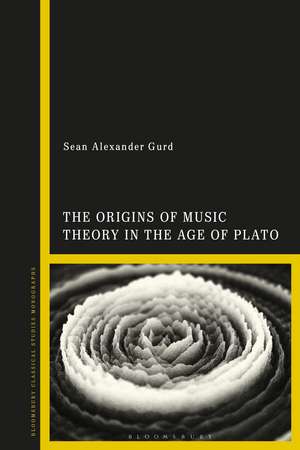The Origins of Music Theory in the Age of Plato
Autor Prof Sean Alexander Gurden Limba Engleză Paperback – 16 iun 2021
| Toate formatele și edițiile | Preț | Express |
|---|---|---|
| Paperback (1) | 217.17 lei 6-8 săpt. | +69.85 lei 7-13 zile |
| Bloomsbury Publishing – 16 iun 2021 | 217.17 lei 6-8 săpt. | +69.85 lei 7-13 zile |
| Hardback (1) | 656.39 lei 6-8 săpt. | |
| Bloomsbury Publishing – 11 dec 2019 | 656.39 lei 6-8 săpt. |
Preț: 217.17 lei
Preț vechi: 274.64 lei
-21% Nou
Puncte Express: 326
Preț estimativ în valută:
41.56€ • 45.32$ • 35.04£
41.56€ • 45.32$ • 35.04£
Carte tipărită la comandă
Livrare economică 24 aprilie-08 mai
Livrare express 20-26 martie pentru 79.84 lei
Preluare comenzi: 021 569.72.76
Specificații
ISBN-13: 9781350194441
ISBN-10: 1350194441
Pagini: 224
Ilustrații: 15 bw illus
Dimensiuni: 156 x 234 x 18 mm
Greutate: 0.32 kg
Editura: Bloomsbury Publishing
Colecția Bloomsbury Academic
Locul publicării:London, United Kingdom
ISBN-10: 1350194441
Pagini: 224
Ilustrații: 15 bw illus
Dimensiuni: 156 x 234 x 18 mm
Greutate: 0.32 kg
Editura: Bloomsbury Publishing
Colecția Bloomsbury Academic
Locul publicării:London, United Kingdom
Caracteristici
Charts the emergence of a conception of the musical ear as a sensual embodiment of rationality and the ways in which that emergence lead to the development of ear training
Notă biografică
Sean Alexander Gurd is Professor in the department of Ancient Mediterranean Studies at the University of Missouri, USA. His books include Iphigenias at Aulis: Textual Multiplicity, Radical Philology (2006), Work in Progress: Literary Revision as Social Performance in Ancient Rome (2012), and Dissonance: Auditory Aesthetics in Ancient Greece (2016).
Cuprins
PrefaceList of Illustrations IntroductionPlatoChapter OneChapter TwoChapter ThreeAristoxenusChapter FourChapter FiveConclusionNotesBibliographyIndex
Recenzii
Impressive and wide-ranging.
[R]ewarding for many different types of readers ... [T]his book will take its place alongside others as a work exploring in what new directions this field may now go.
Gurd combines analytical precision with lucidity and insight, bringing fresh clarity to a notoriously complex set of texts. This illuminating book will be read with profit and enjoyment not only by classicists but by scholars in all branches of the humanities.
[R]ewarding for many different types of readers ... [T]his book will take its place alongside others as a work exploring in what new directions this field may now go.
Gurd combines analytical precision with lucidity and insight, bringing fresh clarity to a notoriously complex set of texts. This illuminating book will be read with profit and enjoyment not only by classicists but by scholars in all branches of the humanities.
